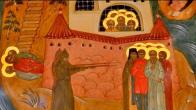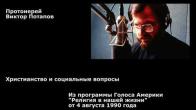You are here
Purgatory and Indulgences
The teaching on purgatory is one of the characteristic differences that distinguish the Roman Catholic confession from the Orthodox Church. According to the teaching of the Catholics, the souls of Christians who have died, if the Lord deems them pure, are sent straight to paradise, while the souls of men who are weighed down by mortal sins are sent to Hades. But Catholics also believe that in the life beyond the grave there exists as well the so-called purgatory (from the Latin, purgatorium) - a special state between paradise and Hades, wherein are found the souls of those who died with repentance for their sins, but who did not succeed on earth in offering satisfaction to God for their sins, and also of those who for some reason or other did not repent of their sins of little importance, for which it would be cruel to send them to eternity in Hades, but impossible also to allow them straight into paradise. In purgatory, the souls burn in a purifying fire; when their sins are expiated, they can receive admittance to paradise. Here, in the course of a certain period, depending on the importance and quantity of their sins, the souls of the dead suffer various tortures, and by these torments they pay for their sins committed on earth, but not yet paid for. When the period of torments ends, when the debt to God's justice is paid in full, the soul passes from purgatory to paradise. Purgatory will exist until the Second Coming of Christ; but the souls of sinners that go thither will not await the Dread Judgement there. Each soul will stay in purgatory as much time as necessary to expiate its sins. The lot of the soul in purgatory depends not only on its repentance, but also on the prayers raised up for it on earth. With the help of masses, prayers and good works performed in memory of the dead by the faithful on earth, the lot of the soul in purgatory can be alleviated and the period of its stay there can be shortened.
As proof of the existence of purgatory and the possibility of forgiveness of some sins in the life beyond the grave, Catholics cite mainly two passages from Sacred Scripture: 1) "And whosoever speaketh a word against the Son of man, it shall be forgiven him: but whosoever speaketh against the Holy Ghost, it shall not be forgiven him, neither in this world, neither in the world to come" (Matthew 12:32); 2) "Every man's work shall be made manifest: for the day shall declare it, because it shall be revealed by fire; and the fire shall try every man's work of what sort it is (I Corinthians 3:13). In the first passage, Catholics see a distinction between sins forgiven during earthly life and sins forgiven in the life beyond the grave. They understand the second citation, about the fire that tries every man's works, in a literal and not in a figurative sense. The Orthodox Church understands the Apostle Paul's words, "the fire shall try", in that sense in which the Fathers of the Church of the post-apostolic age explain them, i.e., in the sense of experience or trial, but not in the sense of fiery torments (see, for example, "The Teaching of the Twelve Apostles").
The teaching on purgatory was elaborated and developed in detail by Thomas Acquinas and finally accepted as dogma at the Council of Florence in 1439.
Some confuse the Latin teaching on purgatory with the Orthodox teaching on the custom houses. The custom houses are only the figurative representations of the particular judgment, which is inescapable for each man; the way from purgatory is to paradise, while the way from the custom houses is both to paradise and to Hades. Nevertheless, in its basic idea, the Latin teaching on paradise has some similarity to the Orthodox teaching on the state of dead men's souls until the general resurrection. This similar-ity lies in the common teaching that the souls of some of the dead, having undergone torments for their sins, can, however, receive forgiveness of sins and alleviation of their torments or even full release from them. According to the teaching of the Orthodox Church, this alleviation of torments or even the complete release from them is received by the soul of one who has fallen asleep by virtue of the prayers and benefactions of members of Christ's Church, whereas, according to the Latin teaching, the souls of dead men receive forgiveness of sins in purgatory by virtue of the purgatorial torments themselves, by which they personally offer satisfaction to God's justice and through this purify their sins.
The period of torments in purgatory can be shortened, according to the teaching of the Catholics, by way of papal indulgences. An indulgence is the forgiveness or the reduction of the temporal punishment that a sinner must undergo for the satisfaction of God's righteousness, after his guilt and the eternal punishment for sins are absolved, through his assimilation, by means of the Roman bishop, of the Saviour's surplus merits and the supererogatory good works of the Theotokos and the saints, outside of the sacrament of repentance. These indulgences are given to living men, who are released by them from the obligation to offer satisfactions and to fulfill penances for certain sins, and to the dead, for whom the period of torment in purgatory is shortened. These indulgences, in accordance with God's great mercy and in accordance with the pope's condescension, can be given out gratis for some pious deed - a journey to holy places (to Rome, for example), for beneficial social undertakings, for some service and donation in the pope's behalf. Indulgences are plenary, which extend to one's whole life and to all one's sins, and partial - to several days or years. Additionally, there are great indulgences, which are given at a certain time to the whole Catholic world, or to a whole country, or to all Christians who are in Rome on some special occasions: for example, during the solemn celebration of jubilees in the Roman Church or during the election of a new pope. These indulgences are given personally by the pope himself, or through the cardinal penitentiary or through bishops and other members of the ecclesiastical hierarchy. In Catholic countries there are special, privileged churches, chapels, altars, icons and statues before which everyone who desires may pray and receive an indulgence for several days. The grace of indulgences may be acquired in certain types of medals, rosaries and crosses hallowed in Rome.
The profitableness of indulgences led to their greater and greater growth and to the search for new occasions for granting them. Not without the influence of financial motives was the theory of indulgences itself worked out as well - frankly, their advocates and sellers were guided by monetary interests. Already long ago, all this evoked a protest against indulgences themselves and against the papacy's trafficking in them. Attacks on indulgences were some of the first features of the reformation movement. It goes without saying that this mediæval teaching on indulgences was completely unknown in the ancient, undivided Church and is unacceptable to us, since it contradicts the whole spirit of Orthodoxy.
©V. Potapov, 1996-98
Address of our Cathedral
Subscribe to our mailing list
While all the materials on this site are copyrighted, you may use them freely as long as you treat them
with respect and provide attribution on the Russian Orthodox Cathedral of St.John the Baptist of Washington DC.









